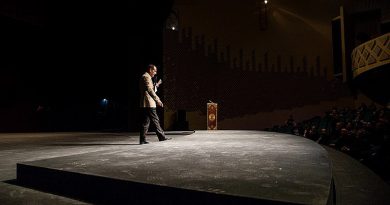Ukraine: Get Involved by Staging Readings of Plays: Dana Rufolo
25 March 2022
Even as you read these words, the Worldwide Readings Project is actively encouraging theatres, acting companies, and amateur and professional performance groups around the world to stage readings of plays by Ukrainian playwrights which protest against the unjust war in their country. The objectives are twofold: to awaken citizens in the free world to the horrors of being initially politically manipulated and then ruthlessly invaded, and to raise funds for Ukrainian refugees by providing lists of reliable relief organizations to which performing groups can transfer financial donations from audience members. The playwrights have waived their right to royalties under the condition that each reading is used to collect money to be donated to the Ukrainian people.
In this article, the first of several, you will read about the development of the Worldwide Readings Project (WRP); be given a summary of eight of the plays that have been translated into English so far, allowing you to, at a glance, ascertain which best corresponds to your resources (for example, the number and gender of characters) as well as being given clear instructions as to how to sign up with WRP as a participant. In future articles, as more plays are translated into English, I will provide a summary of those plays as well. A list of plays translated into German has also been included.
The Worldwide Readings Project
John Freedman, long-time theatre critic for The Moscow Times and author of countless books on Russian dramatic literature, is the founder of the Worldwide Readings Project (WRP). He wishes to make clear that you, your theatre company, your theatre group are all encouraged to participate. You can reach him at this email address:

Freedman told me over the phone: “I personally am doing this because I have to do something.” He is aware that staged readings of Ukrainian-authored plays around the globe will not put a stop to the infernal war in Ukraine. He does believe however that the plays act like ambassadors, telling us something important about Ukrainian culture and making us understand the humanity of the Ukrainian people. Similarly, the person who is actively organizing German participants in WRP, Andreas Merz-Raykov, said in a recent phone conversation between us that that it is an additional comfort to him to know that these readings help to provide humanitarian aid to the Ukrainian people since, as stated above, the playwrights have stipulated that audience members be asked to donate to the Ukrainian cause.
WRP recommends the following organizations receive donations gathered at readings:
Support organizations that help people affected by the war (children, women) at https://voices.org.ua/donat/
Make a donation to an NGO supporting the Ukrainian army: https://savelife.in.ua/donate/
Freedman reminds that although donations can be given to any organization of choice, he suggests that these organizations be located “inside Ukraine to make sure the maximum amount of money actually reaches Ukraine.”
Freedman began the WRP in order to inspire theatre practitioners to Zoom or live-stage readings of plays from Belarus by playwright Andrei Kureichik. The two plays – Insulted. Belarus and the documentary drama Voices of The New Belarus (both published in the magazine Plays International & Europe: Winter 2020 and Winter 2021, and the latter is also published on this website – give faces and names to victims of violent acts of suppression and violence who protested the rigged election that has kept the ruthless dictator Alexander Lukashenko in power. By the end of 2020, there had already been 117 or more WRP readings of Insulted. Belarus in 24 countries and in 20 different languages.
The Ukrainian playwrights who have contributed their plays to the WRP are similarly motivated; they are writing their scripts even as their country is besieged by the invading Russian army. Several of their plays have already been translated by volunteers into English and German and other languages. At the beginning of March, participating theatres from the following countries had already contacted Freedman to say they were doing readings: Austria, Belgium, Czech Republic, England, Finland, Germany, Hong Kong, Israel, Italy, Lithuania, Romania, Scotland, Slovakia, and the United States.
The Worldwide Readings Project has so far offered several wonderfully crafted and extremely touching Ukrainian dramas to the public. Several have already been translated into English.
Many plays will be coming in from the Theater of Playwrights in Kyiv. Maksym Kurochkin, the theatre’s artistic director, initially told Freedman that he did not want to send in short plays he had had planned to stage a month ago, largely because, he says, “they belong to the pre-war era”. Kurochkin sent Freedman this notice: “It seems logical to me that the theatres of the world should now commission quick plays about the current situation from Ukrainian playwrights. That would be helpful! Everyone is now sitting without work, without money. Let them commission, I will be happy to lobby this project among the playwrights of the Theater of Playwrights. But in this way we will retain control over the meanings. This is important.” John Freedman is ready to inform interested theatres on how to commission Ukrainian playwrights to write a play about their current situation.
So, although the plays summarized below do not represent all the Ukrainian plays available, since more work is coming in all the time, they still represent the bulk of plays available in English translation. I have noted each play’s theme and listed practical information that will help directors choose among them.
Ukrainian Plays in English: A Summary
- Return to Sender by Olga Nikora. Five characters: two women and three men. The script is 47 A4 pages long.
Nikora states that her play is “an exploration of what happens when an “us vs them” mentality leads to a complete breakdown in diplomacy which is what we are beginning to see in the western world right now.”
There are many scenes of and references to brutality in the play. For instance, Sasha is motivated to seek out a soldier who tortured her so as to wreak revenge. She tells him, “Oh Victor – Donbass on your hands, prison on your chest, Chechnya on your face – your whole body is a map of the fucking USSR, all you need is a picture of Putin on it”.
- He Who Opens the Door by Neda Nezhdana. Translated by Anatole Bilenko. Two characters: two women, one in her twenties and one in her thirties. The script is 22 A4 pages long.
The action is set in a morgue and has elements of surrealism and humour in it. It explores the theme of fearing abandonment.
Two women are in a morgue, not sure if they are dead or alive. Once they decide they are alive, they discover they are locked in. When finally the doors open they are not sure they want to leave. As one says, “Leave or stay. You can be alive or you can be dead. You choose. There is nothing above or below. Nothing! You have no one else to blame for your troubles and mistakes. You do not have to adapt to the circumstances. You create them yourself. It all depends on you. Your words are your words, your steps are your steps, your shadow is your shadow.”
- Maidan Inferno, or The Other Side of Hell by Neda Nezhdana. Translated by Tetyana Shlikhar. Seven characters: four men and three women, using masks for different roles. The script is 38 A4 pages long.
The play describes the uprising on Maidan Square in 2014 and is largely based on Nezdana’s personal recollections of that time. It demonstrates the need to see the enemy side as also human when one character among the protestors recognizes her brother, a young conscript, on the other side of the barricades and does all she can to prevent him from being shot or wounded. Though the protest is a success, the plays stresses that it was at great loss of human life. One character says, “We should fight for our hearts because they (the enemy) want to bring evil into our souls and make us like them. But we are different. And that should be demonstrated.”
- In the Dark by Natalia Blok. Translated by Daisy Hayes. One or possibly more characters; it is a stream of consciousness piece spoken by one young woman but involving interactions she recalls with several people – girlfriends, a father, a mother. The script is ten A4 pages long.
A young girl of 14 discovers that she is attracted to girls, not boys. Her mother tolerates this information but others respond with anger. The young girl understands as she grows older that she must never show her fondness for women in public. She says, “But here, today, I need to remember that everything we do, we need to do in the darkness and behind closed doors. And what difference if we do it there? The main thing is that nobody sees.”
- Peace And Tranquillity by Andriy Bondarenko. Translated by John Farndon. A monologue that is probably more in a male voice than a female one, but either is possible. The script is seven A4 pages.
The monologue is written like an essay or diary entry and discusses how the author, born in 1978, had not understood that older family members lived through war and misery without end; it had been a mistake to believe that peace and tranquillity is a human right and a Ukrainian right. The monologue ends with the following words: “Where does the privilege of having peace and tranquillity come from? I do not know. If Ukraine survives, maybe I will have an answer to this question. Right now, I do not know. I stand now in some darkness, next to my sister and brother, next to friends, next to my deceased mother, grandmother, grandfather, great-grandfather and great-grandmother, next to all Ukrainians who died in this and other wars and during periods of peace and tranquillity.
“They don’t know, and I don’t know. We just stare at the black darkness in front of us. The light of the house where we were born (is) consumed by flames which do not illuminate the darkness in any way. How can we finally dispel this darkness? Can we?”
- Lost in the Fog – A Fantasy Drama by Neda Nezhdana. Translated by John Farndon with assistance from Ievgeniia Kovryga. Four characters: two young and one somewhat older women and one young man. The script is 27 A4 pages.
During war, in a farmhouse lost in the fog, a soldier, his mother and his pregnant fiancée are living until there is a helicopter crash nearby. The soldier’s former girlfriend is the injured pilot; she is fighting on the opposite side. They discuss the bonds of love that exist between then still, and yet in the end they separate. When she asks why he didn’t escape earlier with his small family, he replies: “Where to? For us, our land is this house, the lake where I fish, the forest where I gather mushrooms, not a coloured spot on a map, which for some reason is called my country”.
- Take Out the Rubbish, Sasha by Natalya Vorozhbit. Translated by Sasha Dugdale. Two women, one aged in her 30s and pregnant, the other her mother in her 50s, one man aged in his 50s. The script is 25 A4 pages.
The play is a comedy of sorts. A wife, Katya, and her pregnant daughter prepare the funeral meal for the military officer Sasha, Katya’s husband, amid memory scenes that re-enact the constant barrage of arguments that Katya and Sasha used to have when he was alive. Yet now that he is dead, the two women grieve deeply for him and remember all the kind acts he performed which they never valorised when he was alive. But a new war looms, and Sasha appears again, returned from the dead. Once again, Katya berates and criticises him for wanting to go fight as he once did, but he is adamant that he returned in order to fight. He tells the two women: “I made an oath. Me, Vova, Sergei, Lyosha, you remember Lyosha? I watched him dying of cancer before my eyes … When we went into the army we made a solemn oath to the people of Ukraine to be loyal and true to them always and carry out our military duties and the commands of our superior officers conscientiously and honourably, and to support the legal constitution of Ukraine, and keep any state or military secrets. Me and Vova, Vova took to the drink before he died, Sergei, Lyosha, we swore an oath to defend the Ukrainian state and guard her freedom and independence. Me, Vova and Sergei, he was colonel as well, and he died of a heart attack as well, and Lyosha we all swore that we wouldn’t betray the Ukrainian people. That’s you, my girls.”
- A Time Traveller’s Guide to Donbass by Anastasia Kosodii. Two characters: no specific gender, both time travellers – one in his 30s and one aged 60. The script is 28 A4 pages long.
This is a mixed-metaphor play where two “pilgrims” set off on a journey through time and memory in Ukraine using a “time machine”. They pass through war zones and landscapes to end up at the first pilgrim’s family home on Cherry Street in the village of Luhansk, where they decide the war started because of the slaughter of a cow.
Ukrainian Plays in German, by Name.
The person to contact if you want to stage a reading in German is Andreas Merz Raykov:

As of 23 March, 15 theatres in Germany have signed up to do readings. There will soon be even more Ukrainian authored plays in German translation, but the following three plays are already available for readings:
Durch die Haut by Natalia Blok, translated by Yulia Gonchar; Zerstörte Straßen by Natalia Vorozhbyt; translated by Lydia Nagel, and Sascha, bring den Müll raus by Natalia Vorozhbyt, translated by Lydia Nagel.









